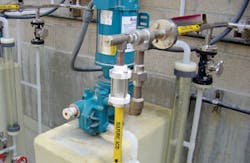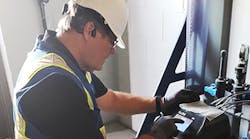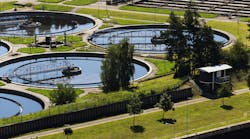No life form, whether human, animal or plant, survives without water. The same is true for industry, regardless if it’s mining, food & beverage processing or steel making.
For one, water facilitates and optimizes production, whether by means of cooling equipment, cleaning totes, barrels or storage tanks. Used in these ways, clean water quickly becomes wastewater, full of impurities. Given increasing regulatory vigilance regarding wastewater handling, that water must be disposed of or recycled in the most environmentally friendly manner possible.
Aiding wastewater disposal or recycling is a wide range of acids used in its processing that makes it safe to either reuse or introduce to the environment. Diaphragm-type metering pumps successfully meet the challenges inherent in most wastewater-handling applications that require the use of any of a wide array of acids.
The challenge
Acids are an industrial jack-of-all-trades for a dizzying array of applications and processes, including making agricultural fertilizers, cosmetics production, drinking-water fluoridation, pH adjustment in cooling towers and boiler-water pretreatment. Versatility makes acids a critical component in water and wastewater handling.
Some common acids used and their characteristics include the following:
- Hydrofluosilicic acid: Occasionally referred to as "silly" acid, hydrofluosilicic acid is often used in drinking-water fluoridation, as a wood preservative agent and in ceramics production. Hydrofluosilicic acid is corrosive to most metals, and has a tendency to find leak paths.
- Hydrochloric acid: Also known as muriatic acid, it is used to remove scale from boilers, in chemical cleaning and to regenerate water used in treating deionization units.
- Phosphoric acid: Used in metals processing, as an etching agent in semiconductor processing and as a biological-growth nutrient.
- Sulfuric acid: Commonly used for pH adjustment in water treatment, making car batteries and metal pickling, cleansing and plating. Because sulfuric acid is highly exothermic, it is one of the more challenging acids to pump.
- Citric acid: A rather weak acid, it is used as a preservative and flavoring agent in food and beverage processing, and as an ingredient in making cosmetics, pharmaceuticals and household cleaning products.
- Safety in containing, controlling and handling these acids is a critical concern, not only to protect worker health and productivity, but to ensure zero environmental impact.
Some acids are more aggressive than others and their corrosive nature and temperature can change dramatically at different concentrations or when diluted. Sulfuric acid, for example, becomes more corrosive when diluted and has a high specific gravity relative to water, so slower pump stroke speeds are desirable when handling it.
Given their aggressive nature and the need to accurately control dosage rate to avoid overfeeding, acids need to be fed via a metering pump with a high level of repetitive accuracy, generally +/-1%.
The material that the pump is constructed of also requires thoughtful consideration. While C-20, PVDF and PVC are the most commonly used housing materials in acid-metering pumps, care must also be taken that all wetted components are compatible with the specific acid being handled. No one single material works well with all acids. Choosing the wrong materials of construction can lead to, at the least, pump failures and, at worst, harmful acid leaks.
The solution
Some experts say hydraulic, mechanical or electronic diaphragm metering pump technology is the best choice for acid injection in wastewater handling. In fact, the Neptune Chemical Co., North Wales, Pa., says its 500 Series hydraulic diaphragm metering pumps, 7000 Series mechanical diaphragm metering pumps and PZ Series electronic solenoid-driven metering pumps help set the standard in safe, efficient, reliable acid-handling in wastewater applications.
Neptune’s 500 Series hydraulic metering pumps are ideal for acid-handling because they inject a precise and controlled chemical amount; feature an internal relief valve; have leak-free operation; can handle higher pumping pressures; require minimal maintenance; can be constructed with an automatic stroke control actuator or variable-speed motor; have low energy usage; and feature an easily adjustable micrometer dial that can be adjusted whether the pump is running or stopped.
Hydraulic metering pumps operate in the harshest product-handling conditions and last for up to 20 years of service. Hydraulic diaphragm pumps have a flow-rate deviation of less than 1%. The 500 Series pumps feature a 10-turn micrometer dial that can be calibrated to 1% increments from 10% to 100% of flow capacity. The pump’s stroke mechanism moves only when adjusted, eliminating unnecessary wear, while the piston is powered through the complete stroke length at all capacities. This removes any concerns about excessive stress, wear or shock.
The 500 Series pumps also feature a "variable oil by-pass stroke adjustment option" that delivers better valve performance than metering pumps with variable-linkage designs. The valve checks optimize performance because they have extra time to seat since they are idle during the by-pass portion of the suction and discharge strokes. The pump valves have cartridges that are removed for cleaning without disturbing the pump’s piping, and referred to as "EZE-CLEAN" valves by Neptune.
To quell material-compatibility concerns, the hydraulic metering pump body, valve and seat construction materials include 316 stainless, C-20, PVC and Kynar. Valve checks are available in 316 stainless steel, C-20, glass or ceramic. The 500 Series pumps can produce up to 94 gallons per hour of flow at 100 pounds of pressure (60 gph/227 lph if the pump is duplexed). Operating temperatures range from 125 F to 200 F with maximum pressures from 150 to 3,000 psi.
Mechanical matters
Neptune 7000 Series diaphragm metering pumps are mechanically actuated and handle clear liquids with viscosities ranging from water-like to 5,000 cPs — ideal for municipal water and wastewater treatment applications. No contour plates are used on the liquid side of the diaphragm. A straight-through valve and head configuration delivers improved flow characteristics.
Pump capacity is manually adjustable via micrometer dial while the pump is running. This allows the pump to produce flow rates ranging from 10 gph to 450 gph at head pressures up to 150 psi. Liquid ends are constructed of PVC with explosion-proof, variable-frequency drive and wash-down duty motor options available. The pumps are self-priming and provide superior performance moving chemicals containing small impurities, such as sulfuric acid.
When choosing between a hydraulic or mechanical diaphragm metering pump, take into account the specific needs of the operation.
The hydraulic pump has a PTFE disc that flexes between two perforated plates. Because the diaphragm is hydraulically balanced, the pump can operate against higher discharge pressures than a mechanical diaphragm pump. On the other hand, a hydraulic diaphragm pump doesn’t have the same suction-lift capabilities as a mechanical diaphragm pump. Hydraulic diaphragm pumps, such as the 500 Series, do offer built-in relief protection, especially desirable in high-pressure applications.
Finally, electronic metering pumps are a viable option in acid-handling operations. Stroke length and speed adjustments make them particularly suited for low-flow acid-feed applications, which can require a wide turndown capability.
Neptune PZ Series pumps feature a "pulse" metering design that operates on any single-phase voltage from 94 VAC to 264 VAC — a crucial consideration if the pump will be operating on solar-powered batteries. Manual stroke-length adjustment ranges from 50% to 100% with proportional control, cycle and counter functions built-in. The PZ Series is available with a PVDF pump head suitable for handling most acids.
Other considerations
In addition to the pumps, when feeding acids, ancillary piping and accessory components must be carefully considered and selected.
When practical, acid-feed skids should be constructed of corrosion-resistant structural FRP or polypropylene. If metallic skids are required, they should include an appropriate paint coating that will resist the specific acid that is to be handled. Integral or secondary containment is also usually desirable.
Diaphragm metering pump check valves operate best when the acid being pumped is clean and free of particulates, so the suction piping system should always include an appropriately sized strainer. When pumping concentrated sulfuric acid, a sludge trap is desirable for removing sludge particles, which will help minimize the possibility of pump failure.
Calibration columns provide an inexpensive, yet reliable and accurate means of verifying pump flow rate. A calibration column of clear PVC is suitable for many acids, although borosilicate glass columns are available and required for use with some acids. A notable exception is hydrofluosilicic acid, which will etch glass.
An injection quill or corporation stop injects the acid into the center of the pipeline, tank or process for more rapid and uniform chemical dispersion. This helps to protect the pipe or tank walls from the corrosive effects of the acid.
Conclusion
As mentioned, water is critical to all forms of life and the successful operation of a wide range of industries. Safe, clean and responsible water treatment, conservation and disposal are increasingly critical issues. Acids in many forms play a correspondingly critical role in treating water and wastewater. Like water itself, proper care and handling of acids must be observed. While wastewater-treatment facilities are aware of their responsibilities in ensuring safe water sources, they must also operate as cost-effectively as possible. That’s where efficient and reliable pumping technology enters the picture.
Ken Underwood is Project Manager, Municipal Products for Neptune Chemical Pump Co., North Wales, Pa. He can be reached at (215) 699-8900 or [email protected].
For more information on Neptune’s full line of products, please go to www.neptune1.com. Neptune is an operating company within Dover Corporation’s Pump Solutions Group (PSG®), Oakbrook Terrace, Ill., USA.


